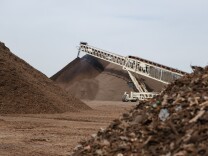
Next Up:
0:00
0:00
-
Listen Listen
Climate & Environment
Expect the warmest and windiest day of the week.
Sponsor
More Stories
-
Marine mammal treatment centers are overwhelmed by sick sea lions, likely due to a toxic algal bloom off of the Southern California coast.
-
Construction could soon begin on a housing development 18 years in the making, in the hills above Sunland-Tujunga, but local wildlife advocates are rallying for the project to come to a halt.
-
The L.A. Department of Water and Power's Board of Commissioners voted unanimously to end the practice of shutting off power when people can't pay their bills during extreme heat.
-
Getting Food Out Of Landfills Is A Big Climate Solution. So Far California Is Lagging On Its EffortsA new report finds the state missed its 2020 goal and is likely to miss its 2025 goal as well.
-
It’s a combination of geography, atmospheric conditions and how we build.
-
Across Southern California, facilities used to treat marine mammals are full.
-
The exact time of the solstice is determined by where the sun is in the sky. During summer, the sun reaches its highest point of the year at noon and its lowest point at the winter solstice.
-
L.A. requires all new buildings to be all-electric, but retrofitting existing buildings is the bigger challenge — and has implications for renters.
-
It’s one of the reasons the fire department is relying more on mobile water stations for their helicopters.
-
New federal funding will help coastal communities fight against rising sea levels and strengthen the electric grid during heatwaves, storms, and other climate events.
-
Benzene is among the pollutants gas stoves emit into homes, Stanford University researchers show. The toxin is linked to a higher risk of leukemia and other blood cell cancers.
-
It’s no fun hanging ten in poop water.
Landfills are the second-largest source of methane emissions in California. That’s why the California Air Resources Board took action to monitor and capture landfill gases.
Support your source for local news!
In case you missed it
-
911 recordings obtained by LAist shed light on why and how emergency planning continues to leave people with disabilities behind.
-
LAist investigates illicit dumping at three Antelope Valley sites.
-
An LAist investigation found toxic heavy metals in samples of fire retardant collected from the Palisades, Eaton and Franklin fires. Here's what that means.
More Stories
-
Extreme wildfires have destroyed about one-fifth of all giant sequoia trees. To safeguard their future, the National Park Service is planting seedlings that could better survive a hotter climate.Listen 6:47
-
Scattered showers and a look ahead to more rain by the end of the week.
-
Aerosol pollutants have masked the effects of global warming. Without them, the U.S. is about to get a lot wetter.
-
A lot of it runs out to the ocean, but we do manage to capture hundreds of thousands of acre-feet a year.
-
A new report finds that one in four people in the U.S. are breathing unhealthy air as rising temperatures and bigger fires create a "climate penalty."
-
For children living near U.S. highways, a transition to zero-emission electric vehicles will mean reduced exposure to dangerous exhaust.
-
The state's parks department is working with stakeholders, including the military, to rebuild the San Onofre road, but no timeline has been given.
-
Built in 1951, the glass-walled chapel is one of L.A.’s few national historic landmarks. This isn’t the first time it has been damaged by landslides.
-
Temperatures rise slightly with clouds sticking around.
-
The dream wedding venue for many had to temporarily close because of damage caused by the Rancho Palos Verdes landslide complex.




































